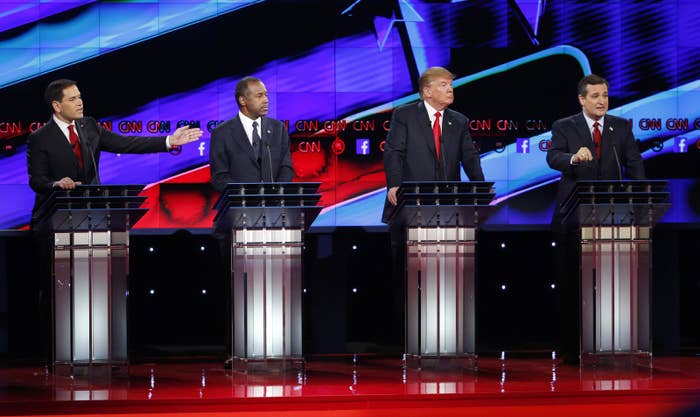
LAS VEGAS — Senators Marco Rubio and Ted Cruz faced off in a bitter back-and-forth on the issue of immigration Tuesday night at a Republican presidential debate hosted by CNN, marking the most high-profile battle by the candidates on a hot-button issue for GOP primary voters.
Amid the backdrop of the glitzy Venetian hotel owned by billionaire Republican mega-donor Sheldon Adelson, Rubio became the target of other candidates for his stance on immigration, specifically on creating a legal pathway to citizenship for undocumented immigrants.
The attacks on Rubio were foreshadowed by an early volley from Rand Paul, who called the Florida senator the "weakest of all the candidates on immigration."
CNN debate moderator Dana Bash later asked Rubio about co-authoring a bipartisan 2013 immigration reform bill — the so-called "Gang of Eight" bill — that would have created a pathway to citizenship for undocumented immigrants.
Rubio had been able to mostly escape previous debates unscathed on immigration. He was asked about that part of his immigration record only once at a previous CNN debate, and Fox News twice avoided directly asking him about the issue.
The Florida senator approached the issue the same way he did the first time CNN asked him, referencing his family's history as immigrants and saying the American people don’t trust the federal government on the issue.
Rubio said the U.S. can’t do anything on the issue until it proves illegal immigration is under control, including completing miles of border fencing and a entry-exit tracking system for immigrants. After that, Rubio said, Americans would be open to discussing what to do with the 11 million undocumented immigrants in the country.
Ultimately, the immigrants could receive a work permit and eventually a visa, he said, avoiding the "path to citizenship" term deeply unpopular with Republican voters.
"I am personally open — after all that has happened and after ten years in that probationary status where all they have is a permit, I personally am open to allowing people to apply for a green card," Rubio said."That may not be a majority position in my party, but that's down the road."
Cruz pounced on the comments, saying Rubio has tried to muddy the waters on his position on immigration. Cruz framed the debate as choosing sides in a crucial battle over "amnesty."
"There was a battle over amnesty and some chose, like Senator Rubio to stand with Barack Obama and Chuck Schumer and support a massive amnesty plan," Cruz said. "Others chose to stand with Jeff Sessions and Steve King and the American people and secure the border."
Border security is national security, Cruz said, calling Kennedy airport in New York City and the Rio Grande the front line with ISIS just as much as Iraq and Syria are.
The protracted exchange then turned to the issue of legalization for undocumented immigrants. The Cruz campaign was prepared. A day before the debate, Cruz campaign chairman Chad Sweet privately told a group of Hispanic Republicans that the Texas senator was opposed to any form of it.
"Ted, you support legalizing people who are in this country illegally," Rubio shot back, adding that Cruz supported a 500% increase in the number of H-1 visas for guest workers. "And Ted supports doubling the number of green cards."
"I have never supported legalization, and I do not intend to support legalization," Cruz said.
In the spin room after the debate, Sweet said the American people aren't fully aware that Rubio and the Gang of Eight supported amnesty, and that the campaign felt good about how the exchange played out.
"Senator Cruz unequivocally, unequivocally does not support legalization," Sweet said. He repeated what he had told Latino conservatives on Monday: that Cruz believes in "attrition through enforcement" — using enforcement to make life for undocumented immigrants so difficult that they return to their native countries.
Sweet disagreed with the notion that this blanket rejection of any form of future legalization could affect the Republican Party's standing with Hispanic voters, especially in a state like Nevada, where the debate was held, which has a sizable Latino population. He said it's a myth that those "who've come here legally in the Hispanic community would actually abandon all the various issues that they care about whether its jobs, growth, opportunity, education for their children just over this sole issue."
Asked if attrition through enforcement amounts to "self-deportation," a policy widely considered to have harmed 2012 Republican presidential candidate Mitt Romney with Hispanic voters, Sweet stopped and started before saying, "We don't choose to use that phraseology. We believe that enforcing the law is the right thing to do."
"Over time we will preserve and expand immigration," Sweet continued, but he said the campaign must first address the trust deficit from American people on the issue.
Rubio campaign communications director Alex Conant criticized Cruz after the debate, saying no viewers were confused about Rubio's "clear and consistent" position on immigration. He accused Cruz of leaving the door open for legalization once again in an interview with CNN's Jake Tapper after the debate.
Alfonso Aguilar, the leader of the Hispanic Republican group that met in Las Vegas the previous day, said the Cruz campaign fundamentally doesn't understand Latino voters and their concerns.
"Look, what happened with Romney is going to happen to Cruz," Aguilar said. "When it comes to Hispanic voters and immigration, they are really clueless. They don't understand the impact this is having on the Hispanic community."
On Cruz's pledge to oppose any and all forms of legalization, Aguilar called it a "desperate strategy" to win the primary.
